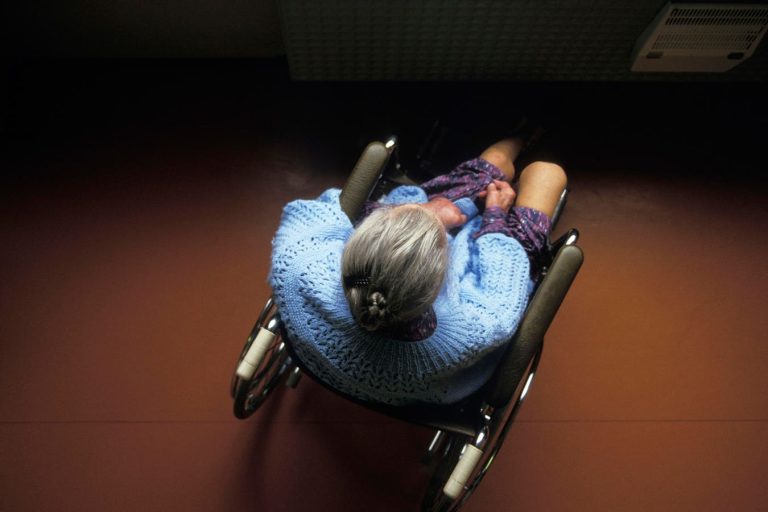An 89 year old woman lives alone in a small apartment in suburbia. She is low income and has government- subsidized housing. She is blind and very hard of hearing. She forgot to turn off the faucet in the sink and flooded her entire apartment. The landlord wants her out. Can he evict her? Do her kids have to help her?
The Issue Of Self-Neglect
Clearly this elder should not be living alone and unsupervised. At AgingParents.com, where we offer advice and strategy about family aging issues, we were consulted by the attorney for the landlord. What can his client do? He, the landlord didn’t quite have the heart to put her out of the apartment in a normal eviction process. The landlord had contacted the woman’s two adult children. They refused to get involved and said their mother was “just fine”. Of course that was not true. She was in significant danger from self-negelct. It probably would have been much better if she had moved out when she lost her vision and her hearing diminished so markedly. But no one came to her rescue.
The Question With Her Adult Children
No one could imagine adult kids of a severely disabled parent like this one credibly telling anyone she was fine. In our experience at AgingParents.com, where we see elder self-neglect now and again, we do hear from the adult children sometimes. They may be the ones who reach out to us for advice, typically out of guilt. Consistently, we hear that the parent who is now in trouble was a terrible parent. Sometimes they were abusive, and neglected or harmed their children in many ways when they were growing up. We hear about horrible relationships and many years of estrangement. The adult child wants nothing to do with that bad parent. But when the aging parent is so vulnerable and has no way to help themselves, sometimes the adult children step up and do help. Usually, it’s because they feel guilty doing nothing. In this matter, all we know is that the landlord was rebuffed by the adult children, no matter how much he pleaded with them to assist their mother.
The Landlord’s Options
In California, where this matter arose, the landlord could go through the eviction process. The elder created a dangerous condition with the flooding which was going to lead to a mold problem in other apartments. She did the damage. He has a legal basis. But his conscience stops him. Here is what we advised:
1. First, we asked if the landlord was willing to spend money to avoid eviction. The answer was “yes” but he didn’t want it to cost much more than an eviction. We suggested that he hire an attorney to petition the court for an emergency temporary conservatorship for the elder, called “guardianship” in other states. Given the sad situation of a seriously disabled adult who was in danger, the court would likely grant the conservatorship. But who would be in charge? The landlord certainly didn’t want the burden of caring for his long time tenant as a conservator. Her children apparently didn’t care to be involved at all.
2. In the county where the elder resides, there is an Office of the Public Guardian. There, paid individuals and volunteers provide the services of conservator for those who have no one else to do the job. We recommended that the landlord hire counsel to apply for the conservatorship while also also requesting that a Public Guardian take charge of the elder’s care and safety as conservator. That may not be an easy task.
3. The landlord does have the right to enter the apartment. He could get the county’s Adult Protective Services to accompany him there so the social worker from APS could see firsthand what was going on. The social worker could then ask the county’s attorney apply for conservatorship for the elder, given that the landlord has the right to evict the elder and she would have nowhere to go.
The Likely Outcome
We anticipated that either the the landlord or the county attorney would be successful in obtaining the conservatorship and getting a Public Guardian appointed. Given the vision and hearing impairments and possible cognitive impairment going on, it would be likely that the conservator would place the aging person in a nursing home. She is low income and would have no other choice. A nursing home is certainly a less than ideal place to spend one’s remaining time in life but it is far better than struggling with all things in an apartment where she can’t see, can’t hear much and probably had serious trouble even maintaining the most basic things in life: food, medical care, safety, and help with daily living.
The Takeaways
1. If you had an abusive, neglectful or otherwise terrible parent who is now in dire straits, consider letting go of the past, neither condoning it nor ignoring its impact on you. That means addressing the present need for help.
2. You can be of help without having to take on the caregiving burden yourself. If your aging parent is what the law calls “gravely disabled” or is a danger to herself or others, a guardianship is possible. Yes, someone has to pay for the lawyer to do that process, but it is not likely to be a huge expense. Someone as impaired as the aging parent is in this real case will probably have the guardianship granted, even if the elder objects. The court has a duty to address the health and safety of a very vulnerable elder, which may override the right to self-determination.
3. Any adult child with a seriously impaired aging parent whom you dislike can delegate the burden of care to others, freeing you of emotional entanglement and guilt. You don’t have to like your aging parent to get something done. You don’t even have to forgive any harm they did to you. You can choose to take a legal step to create safety for them, and once they are safe, you do not have to do much if anything beyond that. Consider it. Being humane is not something you will regret. Letting your parent possibly die of self neglect is something you could live to regret.
Read the full article here









